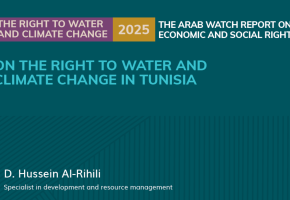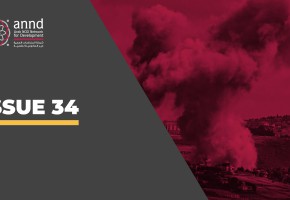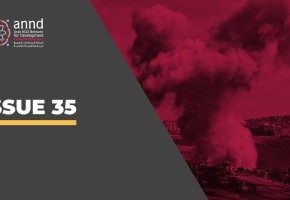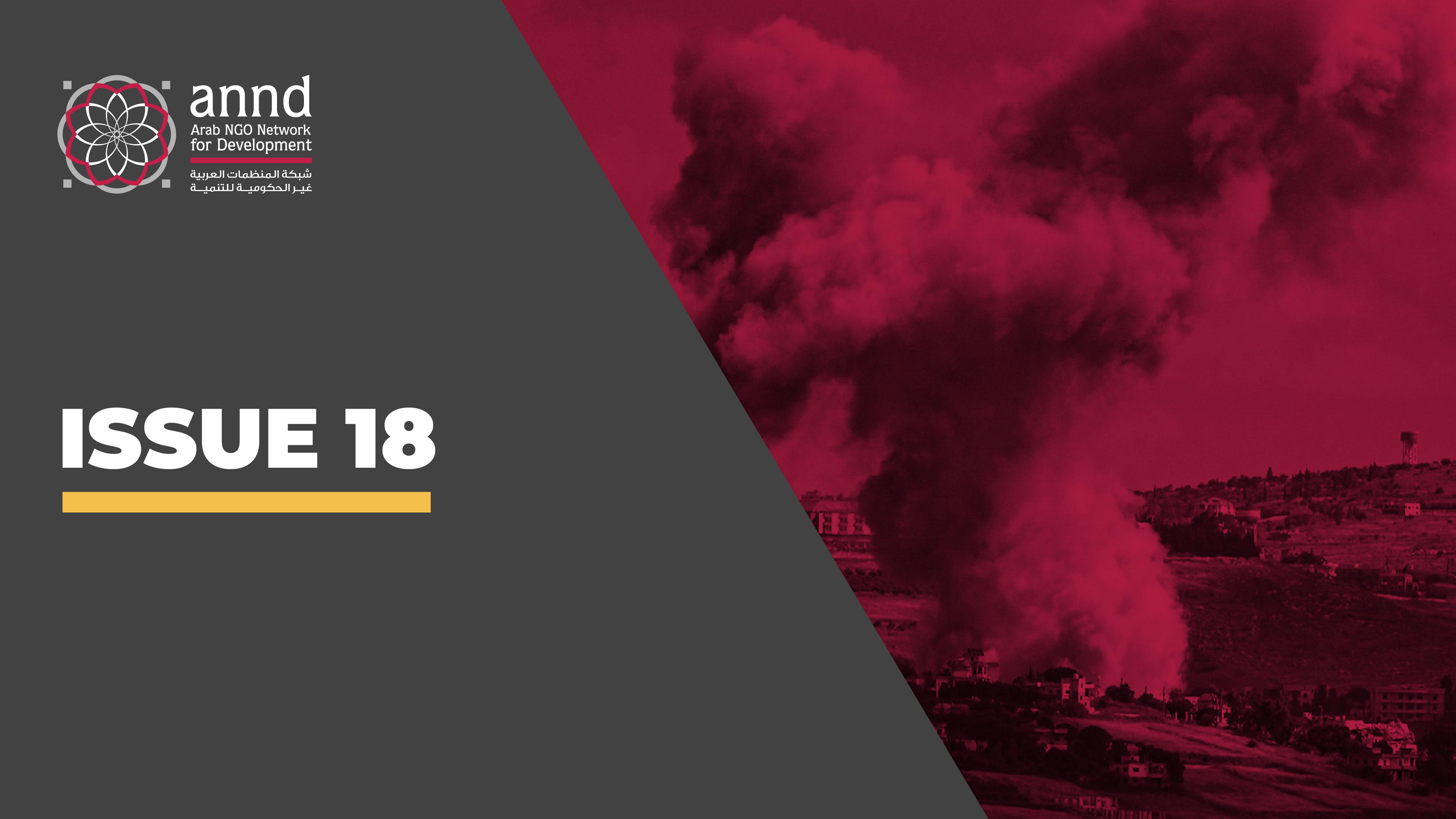
A Region on Fire
Issue 18 - October 14, 2024
The Siege of Northern Gaza Strip and the Burning of Lebanon
The Israeli government is waging an unprecedented war of killing and genocide against the Palestinian and Lebanese people. While diplomatic efforts globally and regionally are focused on attempting to manage the escalation between Iran and Israel, along with the cycle of retaliation and counter-retaliation, and the risks of an open regional war, there is also parallel attention on the military escalation between Hezbollah and Israel, including drone warfare and ground battles. Meanwhile, Prime Minister Netanyahu's government and the Israeli army are intensifying their war crimes on all fronts.
Northern Gaza is witnessing a new phase of genocide, targeting people, and homes, and wiping out all forms of current and future life, without drawing the necessary international spotlight on this atrocity. As for Lebanon, Israeli planes are roaming the skies across the entire country, from the south to the north, killing civilians without accountability, attacking aid convoys, and breaching the positions of the United Nations Interim Force in Lebanon (UNIFIL). All these acts are clear and undeniable war crimes, yet they meet no significant international objection or deterrence.
Gaza is a never-ending hell
United Nations Secretary-General António Guterres condemned the large number of civilian casualties due to the intensification of the Israeli military operation in northern Gaza, including attacks on schools sheltering displaced Palestinians. He urged the parties to the conflict to comply with international humanitarian law and stressed the need to respect and protect civilians at all times.
A team from various UN agencies visited Al-Aqsa Hospital to assess the needs of people after last night's attack. Of the 100 families residing in the hospital's courtyard, 40 families were affected, with half losing their shelters and other belongings in the fire. The team includes representatives from the United Nations Office for the Coordination of Humanitarian Affairs (OCHA), the World Health Organization (WHO), the United Nations Mine Action Service (UNMAS), and the Office of the High Commissioner for Human Rights (OHCHR).
Philippe Lazzarini, Commissioner-General of the United Nations Relief and Works Agency (UNRWA), said that the bombing of an UNRWA school in Nuseirat resulted in the deaths of 20 people, according to reports. He added that the school was supposed to be used for the second round of the polio vaccination campaign, which began today.
The Office of the High Commissioner for Human Rights expressed shock on Monday at the ongoing, heavy Israeli strikes in northern Gaza for more than a week, where tens of thousands of civilians are trapped without food or supplies. In a statement, he said: "As fighting escalates across the Middle East, it appears the Israeli military is isolating northern Gaza completely from the rest of the Strip and conducting combat operations with total disregard for Palestinian civilians’ lives and safety." He also noted that reports had been received of Israeli forces setting up sand barriers at a major intersection, effectively "sealing off northern Gaza" and shooting at those trying to flee.
Muhannad Hadi, the United Nations Humanitarian Coordinator for the Occupied Palestinian Territory, stated that Israel is increasing pressure on around 400,000 people who remain in northern Gaza to force them to move south. He confirmed the absolute rejection of the military siege, which deprives civilians of essential life-sustaining necessities. He pointed out that in the past two weeks, over 50,000 people have been displaced from the Jabalia area, now isolated by the Israeli siege, while others remain trapped in their homes amid escalating bombings and fighting. The UN coordinator also noted that recent military operations in northern Gaza have led to the closure of water wells, bakeries, medical points, and shelters, as well as the suspension of protection services, treatment for malnutrition, and temporary educational facilities. Simultaneously, hospitals have witnessed a surge in critically injured patients.
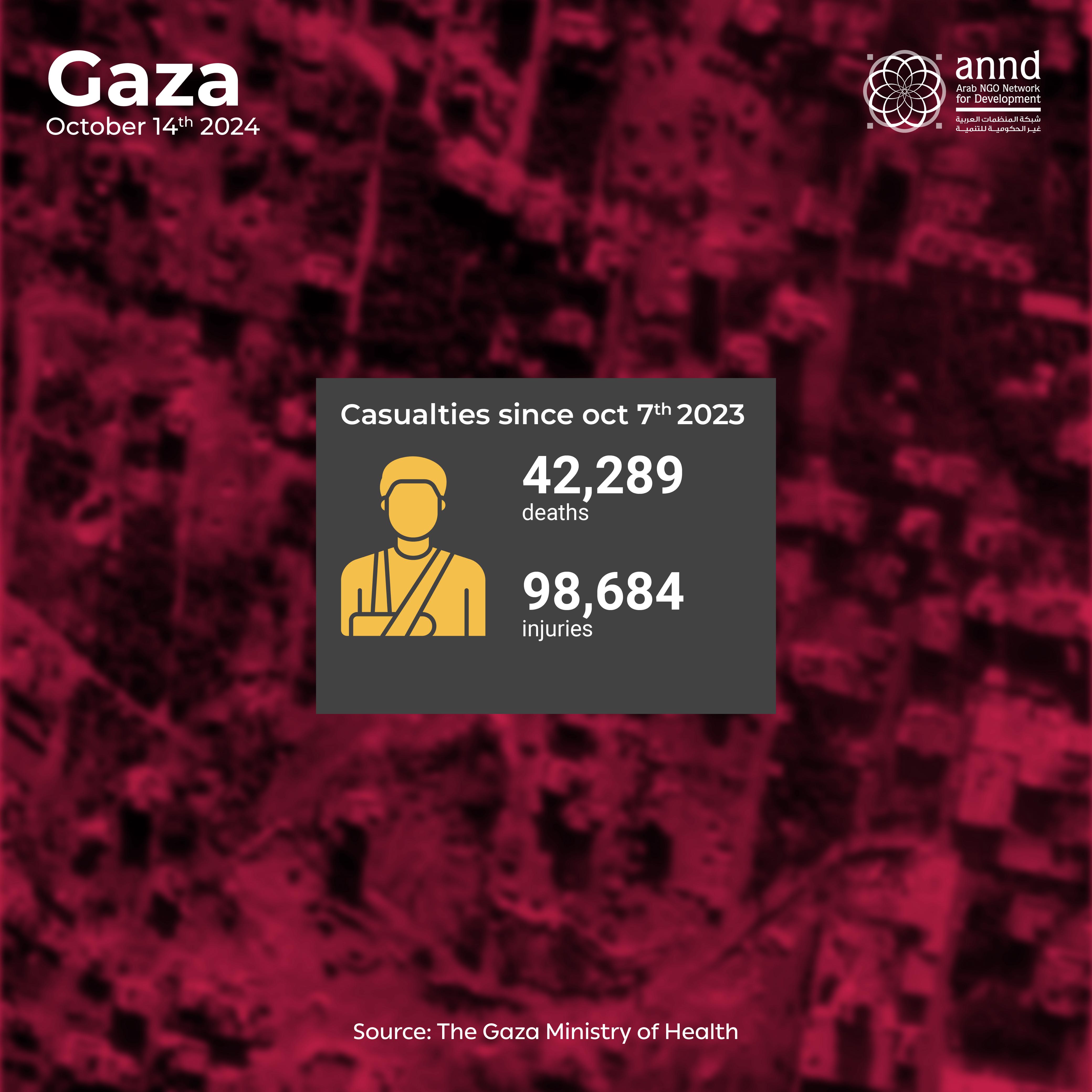
On the 374th day of the aggression on Gaza, Israel continued its intense airstrikes on northern Gaza, and the demolition and heavy bombardment of the Jabalia area persisted for the tenth consecutive day. The Gaza Ministry of Health reported that the Israeli occupation committed four massacres in Gaza, resulting in 62 martyrs and 220 injured in one day, bringing the total casualties of the Israeli aggression since October 7, 2023, to 42,289 martyrs and 98,684 injured.
Battlefield Developments in Lebanon
On the 22nd day of the Israeli aggression on Lebanon, Israel continued its heavy bombardment and targeting of civilians and health centers. It launched fire belts, particularly in the Beqaa between Riyaq and Baalbek, and committed a massacre by targeting civilians, resulting in 23 martyrs in the town of Aito (Zgharta), attacked for the first time since the war began on October 8. Airstrikes also targeted an aid convoy of five trucks bearing the Lebanese Red Cross flag in the Ain region, damaging three trucks. The Israeli army also continued to target health and ambulance centers, launching an airstrike that destroyed the Islamic Health Organization's center in Yuhmur al-Shuqayf, wounding the rescuers inside. It also targeted near Dar Al-Amal Hospital in the Beqaa.
Regarding evacuation warnings, the Israeli army today warned 25 more towns and villages, bringing the total number of villages it has called to evacuate to 129 in the South and Nabatiyeh governorates, including 82 south of the Litani River and 26 between the Litani and Awali rivers, representing 8% of Lebanon's total area. The army also called on residents of the Beqaa and southern suburbs of Beirut to leave their homes, claiming the presence of Hezbollah headquarters or centers. Maps show that 32% of Lebanon’s total area has been affected by evacuation orders and mass displacement, either northward or toward the Syrian border.
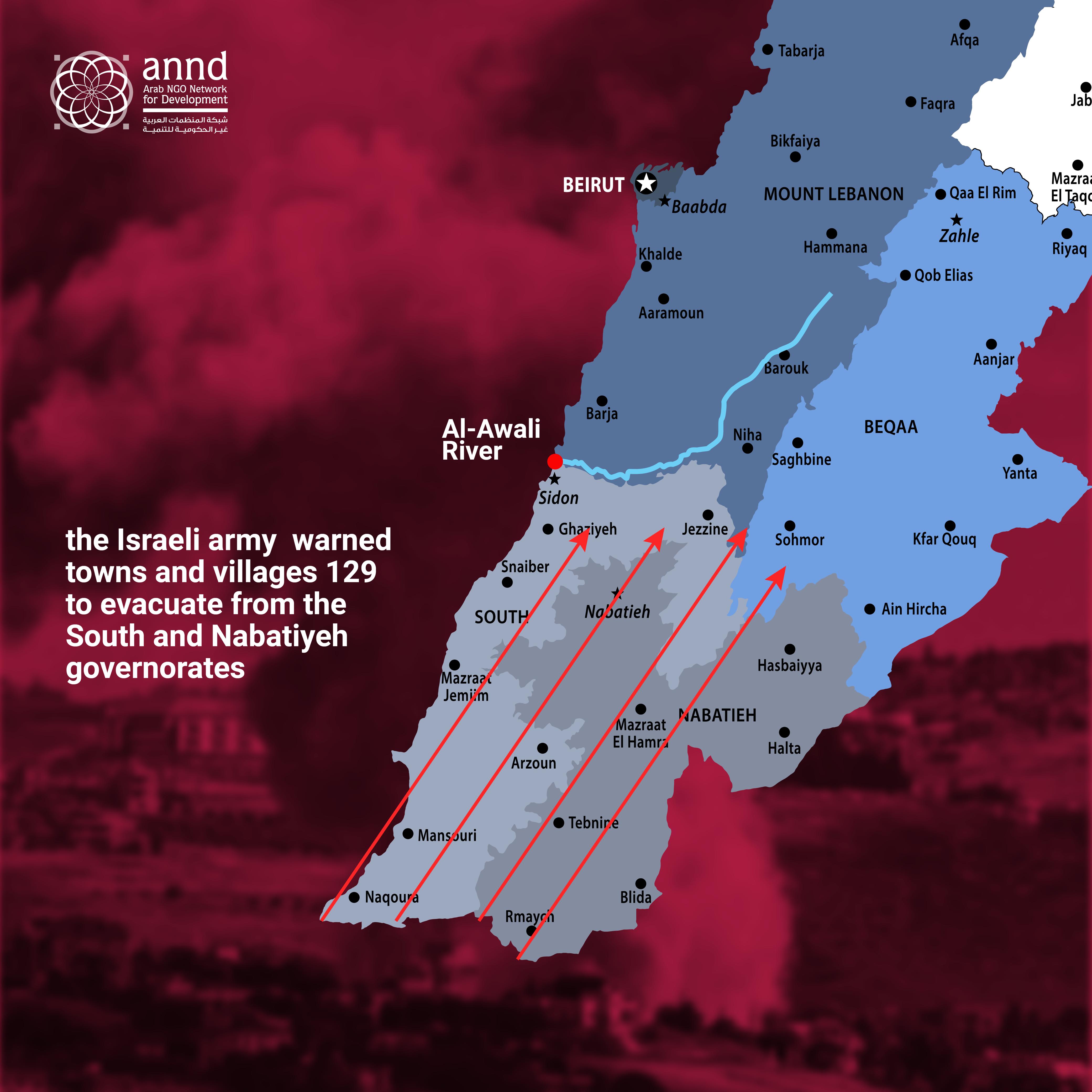
Hezbollah, in a complex and coordinated operation, managed to penetrate Israel's air defense system and Iron Dome, delivering a severe blow to the Israeli army by targeting the Golani Brigade camp—one of Israel’s strongest brigades. The attack killed four soldiers and injured more than sixty. The Golani Brigade is the only brigade that has been continuously operational since its formation and holds significant importance for Israel. Hezbollah also continued to launch dozens of rockets at northern and central Israel.
As a result of the aggression, 2332 people have been martyred, and 10788 injured since the start of the conflict, with yesterday's toll being 26 martyrs and 90 injured. The detailed casualties are as follows: South Lebanon: 3 martyrs, 48 injured; Nabatiyeh: 29 injured; Beqaa: 5 injured; Baalbek-Hermel: 2 injured, North: 23 martyrs and 6 injured.
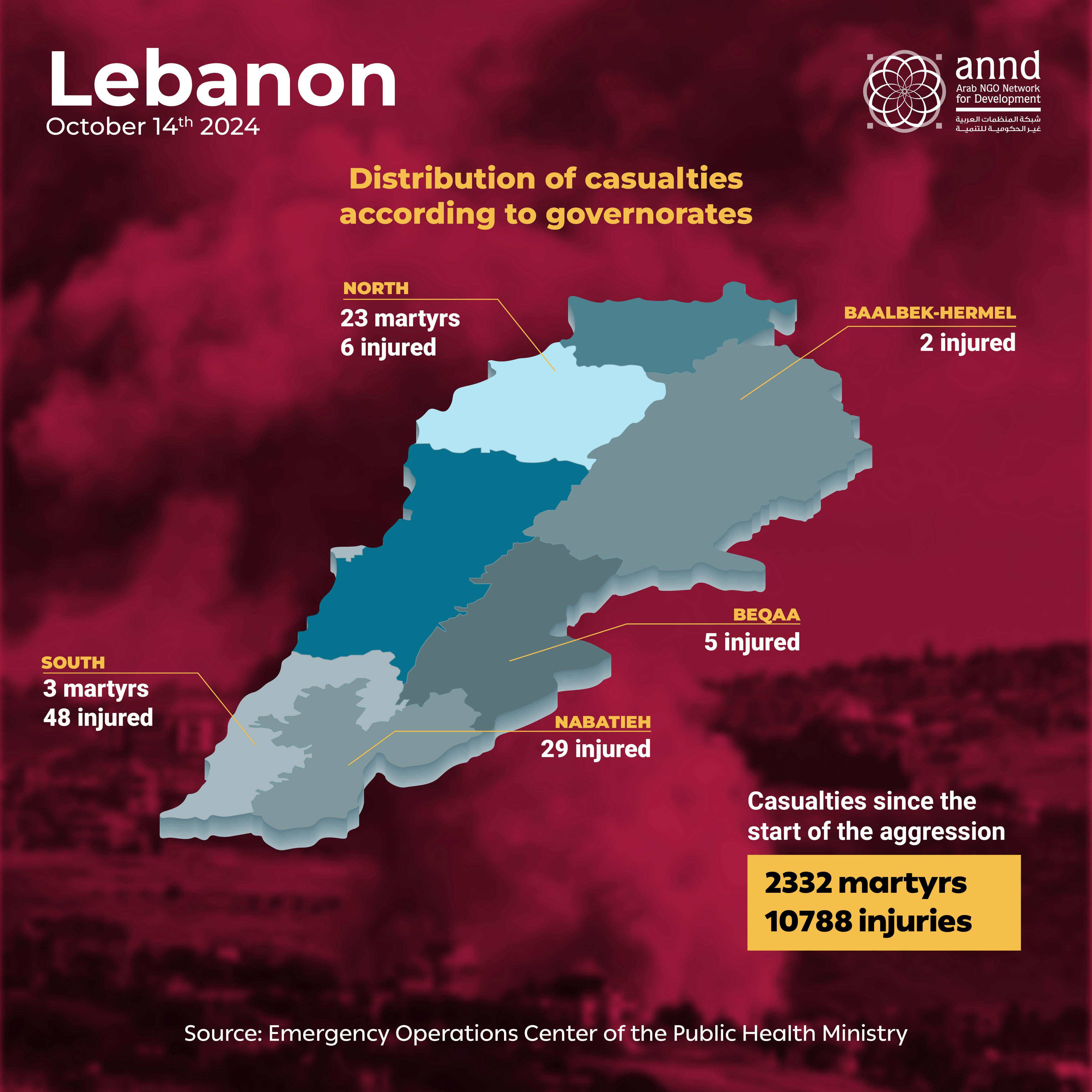
Political Positions
The Lebanese Ministry of Foreign Affairs deemed Israel's attacks on UNIFIL a dangerous precedent and a violation of international law and Resolution 1701. It called on the United Nations Security Council to take a firm stance against Israeli attacks on UNIFIL and prevent their recurrence.
The “Saydet Al Jabal” gathering stated that "anyone obstructing the election of a president for Lebanon is serving Israel's interests by allowing it to continue its aggressions against the homeland, potentially leading to its dismantling."
Hezbollah's media relations office issued a statement condemning the BBC for sending a press team with the Israeli army to southern Lebanon, calling it an unjustified and unacceptable move.
Humanitarian Response
On Monday afternoon, a Saudi aid plane arrived at Beirut Airport, the second in a series of airbridge planes carrying humanitarian and medical aid to Lebanon. An aid plane from the Sultanate of Oman also arrived at Beirut Airport.
The Turkish Embassy in Lebanon announced in a statement that Turkey, for the second time in a month, sent around 300 tons of humanitarian aid to Beirut Port on October 9, transported via two Turkish military ships. The aid package includes thousands of tents, blankets, rolled mattresses, cooking utensils, food supplies, and cleaning materials.
The World Food Programme (WFP), in coordination with relevant authorities, sent a convoy from Beirut to Rmeish carrying vital humanitarian aid, including around 3,000 food rations (enough for 15 days) and 1,200 loaves of bread to support displaced persons.
The Consulate General of Lebanon in Brazil announced the dispatch of a second batch of medical aid, totaling four tons of various medications for the war-wounded.
The Embassy of Sri Lanka in Lebanon announced that it would provide shelter to the most vulnerable Sri Lankan nationals displaced by the current security situation.
A Qatari aid plane arrived at Rafic Hariri International Airport, carrying medical supplies, bringing the total Qatari aid to more than 50 tons. The Egyptian government sent a plane with humanitarian and medical aid, with more planes to follow, in coordination with the Egyptian Embassy in Lebanon.
An aid plane from the Hashemite Kingdom of Jordan arrived in Lebanon carrying humanitarian supplies for displaced persons. In a television interview, the Lebanese Minister of Health emphasized the importance of cooperation and coordination among all sectors of the medical field, municipalities, and mobile teams, stating that the Ministry operates hotlines to communicate with displaced patients and meet their needs free of charge.
Red Cross President Antoine Zoghbi said in a television interview, "We do not lack medical supplies as of today, but we will undoubtedly need international aid in the coming days."
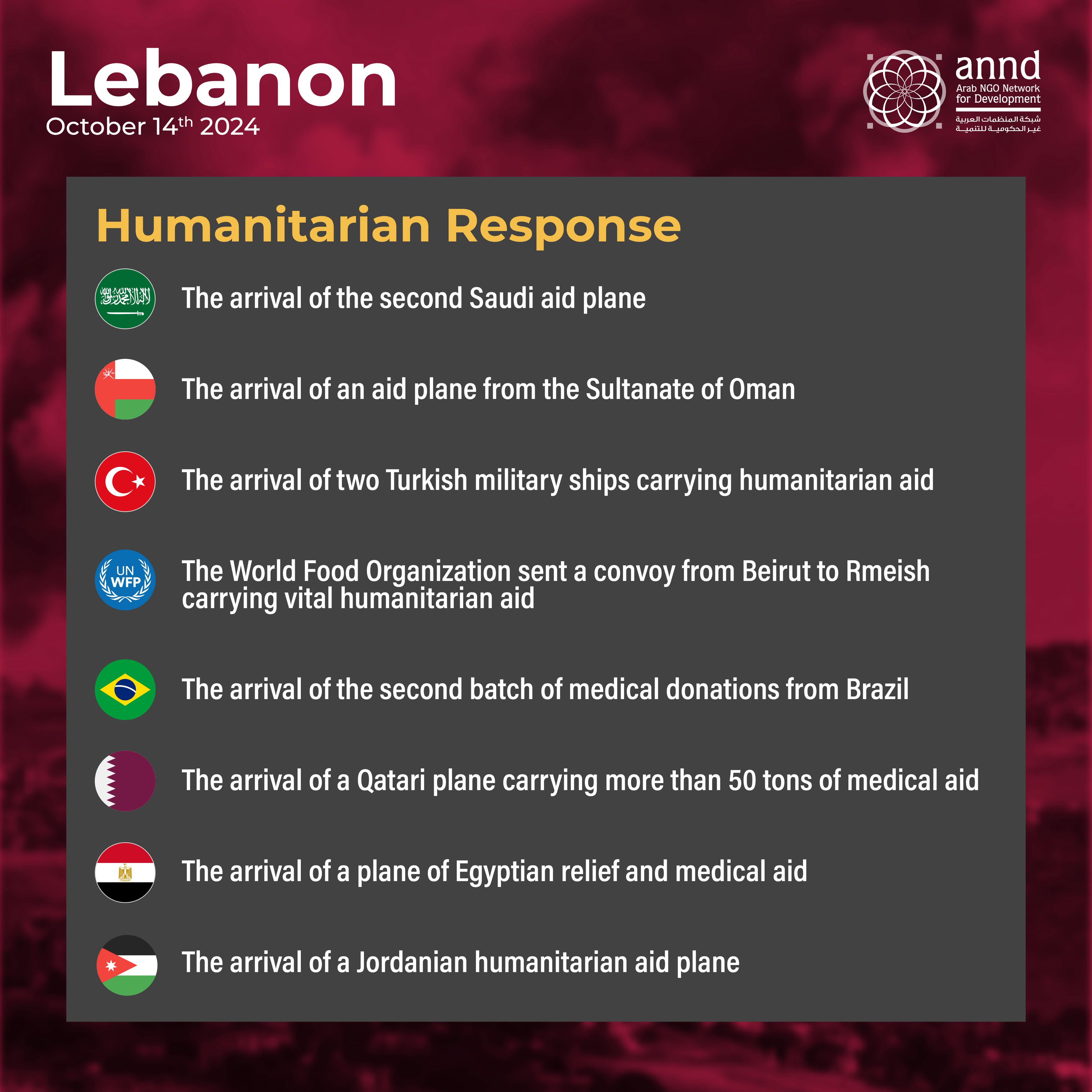
International Positions
Jordanian Prime Minister Jaafar Hassan reiterated Jordan’s rejection of the Israeli aggression on Lebanon and called for adherence to the implementation of Resolution 1701.
The Spanish Prime Minister announced that Spain and Ireland are calling on European Union countries to suspend the free trade agreement with Israel.
The Irish Foreign Minister stated that Israel is undermining the United Nations and peacekeeping forces.
The European Union’s High Representative for Foreign Affairs and Security Policy, Josep Borrell, condemned the "completely unacceptable" Israeli attacks on UNIFIL sites in southern Lebanon, calling such attacks a serious violation of international law.
Secretary of the Expediency Discernment Council of Iran Mohsen Rezaei said that Hezbollah has rebuilt its combat structure following the assassinations, and that Hezbollah's war machine has been launched and that difficult days await Israel as it has now begun its military operations. The Iranian Foreign Minister also stated that his country does not want war with Israel but is prepared for it.
Netanyahu said that Israel will continue to strike Hezbollah in all areas of Lebanon, including Beirut, in response to Hezbollah's bombing of a military base in southern Haifa.
The United States has increased its level of support for Israel by sending it the THAAD system and 100 soldiers operating this system
